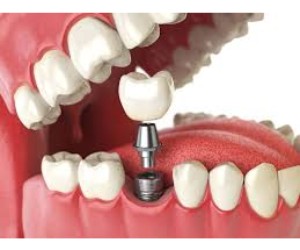Dental Implants: The Good, the Bad and the NOT so Ugly
Contrary to popular belief, dental implants are now less painful (often with even no pain at all) in comparison to that of extractions or tooth removal. In fact, most patients opt for this type treatment rather than going for dentures or other type options. However, it is natural for you to have some apprehension before getting a dental implant, and so to assist you in this matter, I have compiled a guide with some of the most common questions about overseas dentistry (or “Dental Tourism” as it’s often now regularly referred to these days).
What is a dental implant?
 A dental implant is a process whereby an artificial tooth root made out of titanium is used to replace a broken or missing tooth. A crown or replacement tooth is then fitted on the implant to replicate the appearance as well as function of an actual tooth. Dental implants can be used to support either one crown or a fixed bridge.
A dental implant is a process whereby an artificial tooth root made out of titanium is used to replace a broken or missing tooth. A crown or replacement tooth is then fitted on the implant to replicate the appearance as well as function of an actual tooth. Dental implants can be used to support either one crown or a fixed bridge.
What is the benefit of getting an implant?
An implant is considered a better option than dentures. This is because implants offer a permanent solution to the missing teeth, and unlike dentures they do not require regular maintenance. They also do not require support from the adjoining teeth, and plus they promote better oral health too. Above all, dental implants mimic the naturalness and form/operation of a real set of teeth, allowing you to smile and eat without any hesitation. Talk to your local or international dentist and discuss the ways an implant can be beneficial for your overall health.
How much do implants cost?
Costs of dental implants vary, but in the United States you can expect to pay between $3,000 ‐ $5,000 for the overall procedure, which includes implants, surgery, crown, and cosmetic requirements. On the other hand, getting the treatment done from a reputable dental clinic abroad can save you as much as $2500 ‐ $3500 per dental implant with crown. However, when you are comparing prices, make sure to request estimates for the whole procedure, including consultation charges, X‐Rays, medications, etc., because there are many clinics that advertise implants at a very low price but then charge separately for any other areas that are also an integral part of the treatment. Look for places that offer straightforward, all‐inclusive pricing via a clearly written proposal in your native language (i.e. English).
Why are implants so less costly in other countries, compared to the US?
Implants are cheaper in other countries because an implant specialist (Implantologist) working in the United States typically has a high salary (and high costs at that). As, besides their elevated rate of pay in the US, they also have significant overhead expenses to bear, including office space, insurance and marketing costs, which are usually passed down to patients (especially for patients who are not covered by dental insurance). On the other hand, dentists who work abroad do not command a high salary and generally work longer hours each day in comparison to their North American brethren (i.e. in South America that is simply the norm in all occupations). Retail spaces, staff, and insurance also typically cost less in other areas of the world than in America. For one, our Cuenca, Ecuador based Dental Clinic is comprised of a team of highly qualified and experienced dentists, who use the same practices of American standards as the dentists in the US, Canada and Europe, in addition to also utilizing the same brands of implants.
How many trips to the dentist abroad will be required?
The longevity of the procedure depends on the duration of your stay in Ecuador, along with your body’s healing ability. It also depends on the number of implants you are getting. For example, in a conventional dental implant, two trips over a three‐to‐six month period are sufficient. In the first trip, we conduct the required tooth extractions and bone grafts, while the second trip will include fitting of the abutment and crown. Each of the trips requires approximately 7 – 14 days.
What are “immediate loading” implants?
Immediate loading implants, also known as instant implants, are a modern procedure where both the implants and the crown are placed together in and atop the patient’s jaw at the same time, and don’t require multiple visits. However, many patients under a variety of different circumstances can’t or won’t tolerate an instant implant, and so it is best to talk to your dentist about your own unique situation during your first appointment with them (as well as via email for before your trip in the case of Dental Tourism). If the dentist finds you to be a suitable candidate for an instant implant, then that’s great for you – you won’t in such case need to make a return trip.
Is the procedure painful?
As with any dental procedure, you may feel some soreness in the jaw for a few days, which is usually relieved quite easily with over‐the‐counter pain medication (if any at all is necessary). You can also choose to get full anesthesia during surgery, though the rules and ways for doing so vary from place to place and country to country. However, make sure to talk to the dentist beforehand.
What is a bone graft, and do I have to get one?
A bone graft becomes a necessity if you don’t have sufficient bone material in the jaw to support the implant. The procedure of bone grafting includes placing a special material at the implant’s site to restore bone density. Dentists usually take a 3‐D (Panoramic) X‐Ray or CT Scan of the mouth in advance of getting your dental implant(s), so as to determine if the depth and width of the bone are adequate for the implant.
How long do implants last?
If placed and maintained properly, a dental implant can last for up to 25 years or longer (often for the rest of a patient’s lifetime). However, you have to care for your new artificial/replacement teeth, just like you’d care for your own natural teeth. This includes proper brushing, flossing, and regular periodontal visits for cleaning and checkups.
Where can I find more information about overseas dental implants?
Getting a dental implant abroad may be a cost‐effective solution, but naturally it requires careful planning in advance of your trip as well. Our Dental Clinic here in Cuenca, Ecuador, will most definitely assist you in every step of the way though in coordinating your Dental Vacation. From learning more about the complete procedure to preparing your Dental Treatment Plan, arranging your travel/airport pickup and reading verified patient reviews ‐ we are here to help! Contact us through any most convenient means, and we genuinely look forward to making your smile reflect the new you that you’ve always wanted!!





















